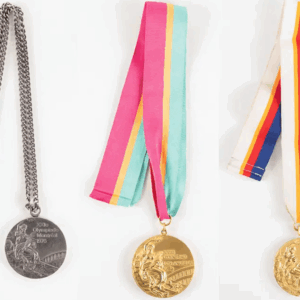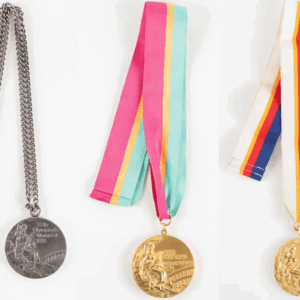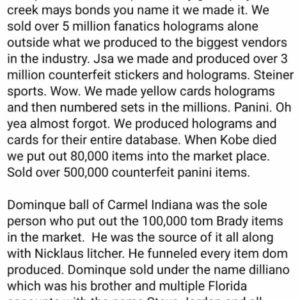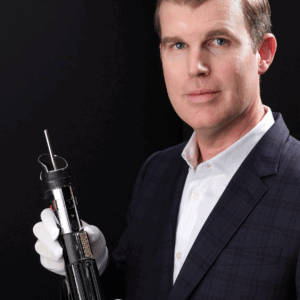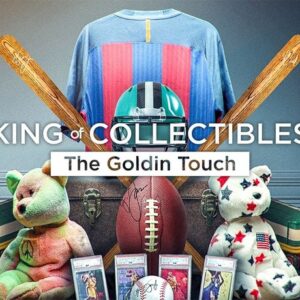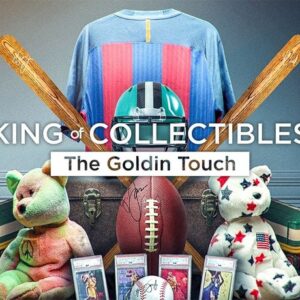The world of sports memorabilia has found itself at the center of a chilling thriller, albeit one with very real, not reel, repercussions. The complex web of deceit unraveled in Indiana has left the collectibles industry shaken to its core. At the heart of the scandal was Brett Lemieux, a charismatic autograph dealer who plied his trade amid the sports collectibles community until his untimely and tragic demise during a Westfield police raid in pursuit of a colossal counterfeit memorabilia ring.
Even though the Hamilton County Coroner’s Office is yet to disclose an official cause of death, the narrative from Westfield police paints a somber picture: Lemieux died from a self-inflicted gunshot wound as officers descended with a search warrant in connection to the multi-million dollar fraudulent operation. The scandal, suffused with intrigue and betrayal, unfolded like a Hollywood plot, touching every corner of the sports memorabilia market.
The shocking unmasking of this counterfeit empire followed a startling post that surfaced in the “Autographs 101” Facebook group—ostensibly authored by Lemieux. In a cyber confessional seemingly ripped from the pages of a thriller novel, Lemieux admitted his role as the clandestine architect behind a staggering four million forged sports items. The post shook the autograph aficionado community, inflicting enduring doubts about the authenticity of countless prized possessions now in doubt.
Operating under the savvy business moniker Mister Mancave, Lemieux’s empire declared itself the largest purveyor of framed sports jerseys on the internet. However, scratch beneath the surface, and it became a façade, with a supposed Columbus, Ohio, address that lacked any physical presence, even as Mister Mancave was incorporated twice in Indiana between 2018 and 2023.
Lemieux’s alleged cyber confession detailed a forgery apparatus targeting the hologram stickers beloved by heavyweight authentication firms such as Panini, Fanatics, and James Spence Authentics. The operation reached a moral nadir following the tragic death of Kobe Bryant in 2020, when Lemieux claimed responsibility for flooding the market with a staggering 80,000 fake Bryant memorabilia items, ingeniously bedecked with counterfeit yet seemingly genuine holograms.
The faker’s playground was not constrained to basketball either. Lemieux’s online enterprise brazenly offered gems like Aaron Judge-signed baseballs, purportedly adorned with Fanatics holograms at a mere $399—a veritable steal compared to the authentic $699 price point from Fanatics. These cunning deals, strategically undercutting official dealers, largely escaped scrutiny due to the credibility conferred by the faux holograms.
In the aftermath of these revelations, industry leaders are scrambling to restore integrity and consumer confidence. Fanatics, a bastion in sports authentication, had presciently revamped its hologram protocols two years prior in anticipation of such skullduggery and continues to engage with law enforcement and fraud specialists, including ex-FBI agents, to fortify the barriers against counterfeit infiltration.
Skepticism swirls around Lemieux’s purported figures. Although one competitor branded the alleged $350 million in sales as “impossible,” the undeniable havoc sowed by this scheme endures. Steve Grad, a revered authority in autograph verification, warns that sophisticated forgery technologies, like autopens, render the task of detecting duplicitous autographs daunting—a reality that could echo for years to come.
Industry insiders harbor traces of the grim satisfaction of vindication; many had harbored suspicions about Lemieux’s prolific supply of autographs from athletes who hadn’t engaged in public signings for years. Intimations in Lemieux’s so-called “manifesto” named others, most notably Indiana’s Dominique Ball and Wisconsin’s Nickolas Litscher, both of whom deny involvement vigorously. Litscher has even initiated legal proceedings in protest after his name took center stage post-revelation.
Authorities suspect Lemieux’s counterfeiting conglomerate donned multiple business guises, including Ultimate Sports and Signature Dog, adapting deftly across diverse selling platforms to propagate its fakes.
As law enforcement navigates the aftermath, and the collecting community reckons with collateral doubt shadowing their valuables, the scandal underscores an indelible lesson. For the sports memorabilia market, this is a clarion call reinforcing the necessity for unrelenting vigilance and innovative fraud countermeasures to guard the sanctity of cherished collectibles.

